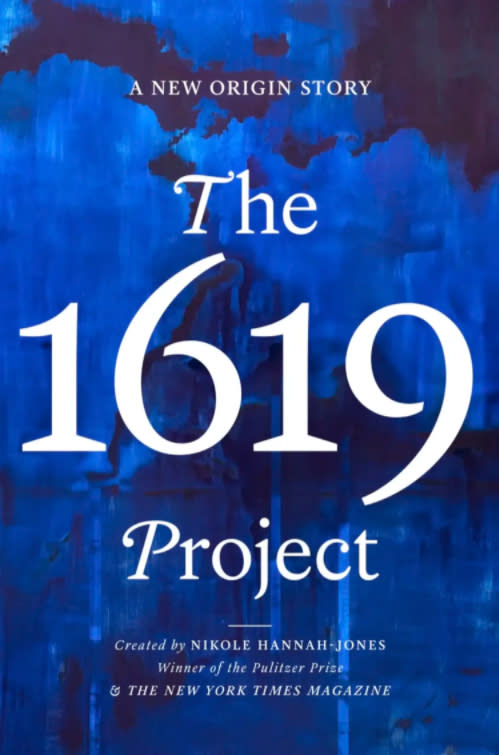Nikole Hannah-Jones on 'The 1619 Project': 'More truthful, but not comforting'
- Oops!Something went wrong.Please try again later.
After the New York Times Magazine published the 1619 Project produced by Nikole Hannah-Jones two years ago, the backlash it sparked came along with the accolades it garnered. But this week, the award-winning project marking 400 years since the first African slaves were brought to the American colonies has been adapted and expanded into a book.
“The 1619 Project: A New Origin Story,” is comprised of 18 essays and 36 poems and works of fiction, highlighting the legacy of slavery in the United States, and how it continues to shape contemporary American life. Hannah-Jones also expands the historical facts of slavery in her children’s book, “The 1619 Project: Born On The Water.” Both books were released Tuesday.
In an interview with Trymaine Lee, host of the MSNBC podcast “Into America,” in front of an audience at Harvard University where he is a fellow, Hannah-Jones spoke about the legacy of 1619, and the way Americans’ understanding of historical events can evolve.
“Life, liberty and the pursuit of happiness; those words are powerful,” she said in the interview, which will be featured in the podcast Thursday. “We just have never lived up to them for a single day. So if you believe in that kind of vaunted 1776 origin story, that’s the comforting origin story. The 1619 Project, I would argue, is more truthful, but not comforting. It’s not comforting at all.”
The 1619 Project received harsh criticism for the main conceit of the project, which was that America was not founded in 1776 when it declared its independence from England, but in 1619 when the first African slaves were brought to the colonies and exploited.
Then-President Donald Trump took aim at the narrative last year during a White House press conference, during which he expressed the government’s need to restore patriotic education in schools. Hannah-Jones said she received intimidating emails and voicemails that used racial slurs, as well as threats that her home would be burned down.
She said she thought about the project “all the time” as she was working on the initial magazine feature.
“I also felt a tremendous burden to get it right, to do justice to that suffering, to do justice to our ancestors,” Hannah-Jones said. “And then facing, you know, constant attacks, not just on the work, but on my credibility as a journalist, I became a symbol; and I think we would not be being honest if we didn’t say me being a Black woman in particular, a Black woman who looks and presents the way that I do, that I didn’t get a certain, extremely vicious type of pushback.”
While the negative reactions to the 1619 Project took a toll on her, she said, she believed the effort would be worth the difficulties.
“It was the most difficult, emotionally draining project I’ve ever worked on,” Hannah-Jones said. “I cried a lot making the project, because it wasn’t writing about someone else’s community. It’s not like at the end of the day, I just went home and wasn’t thinking about it anymore. I thought about it all the time; and I also felt a tremendous burden to get it right, to do justice to our ancestors.”
The book explores how racial economic inequality continues to leave Black people at a lasting economic disadvantage. According to a 2020 report by the U.S. Census Bureau, Black Americans had a poverty rate of 19.5 percent, the highest poverty rate among any race. The average net worth of a white American family, as of 2019, was $988,400, while a Black family’s average net worth was $142,500, according to the Federal Reserve’s 2019 Survey of Consumer Finances. The gap has not shown significant change between 2016 and 2019, according to the report.

“When we think we see the legacy of slavery everywhere, we’re not being paranoid,” Hannah-Jones said. “Like, it’s actually everywhere, and it’s constraining our lives; but we also have the power agency because Black people have always exercised agency, despite the odds.”
She publicly exercised that type of agency earlier this year when an offer of a faculty position at the University of North Carolina at Chapel Hill, her alma mater, was offered, then rescinded because college administrators did not approve of the overall message of the magazine project. When the tenured position was eventually re-issued after campus protests and outrage from supporters, she declined the role and instead took a faculty position at Howard University, the historically black research institution in Washington, D.C.
Although the 1619 Project sparked fury, Hannah-Jones said the positive response from the Black community has made her feel that the project is the “most amazing, impactful work of her entire career.”
“All I ever feel every day is a great sense of pride and a great sense of debt that I owe to all those who came before me to allow us to be here; and there’s nothing that can take that away,” she said. “But in the end, I just believe so fervently in the moral drive of my work — that my work is right, that I’m working towards justice.”
